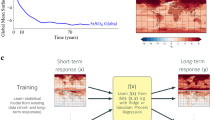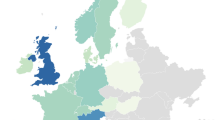Abstract
Artificial intelligence (AI) models have significantly impacted various areas of the atmospheric sciences, reshaping our approach to climate-related challenges. Amid this AI-driven transformation, the foundational role of physics in climate science has occasionally been overlooked. Our perspective suggests that the future of climate modeling involves a synergistic partnership between AI and physics, rather than an “either/or” scenario. Scrutinizing controversies around current physical inconsistencies in large AI models, we stress the critical need for detailed dynamic diagnostics and physical constraints. Furthermore, we provide illustrative examples to guide future assessments and constraints for AI models. Regarding AI integration with numerical models, we argue that offline AI parameterization schemes may fall short of achieving global optimality, emphasizing the importance of constructing online schemes. Additionally, we highlight the significance of fostering a community culture and propose the OCR (Open, Comparable, Reproducible) principles. Through a better community culture and a deep integration of physics and AI, we contend that developing a learnable climate model, balancing AI and physics, is an achievable goal.
Similar content being viewed by others
References
Bauer, P., A. Thorpe, and G. Brunet, 2015: The quiet revolution of numerical weather prediction. Nature, 525(7567), 47–55, https://doi.org/10.1038/nature14956.
Beucler, T., M. Pritchard, P. Gentine, and S. Rasp, 2020: Towards physically-consistent, data-driven models of convection. 2020 IEEE International Geoscience and Remote Sensing Symposium, Waikoloa, HI, USA, IEEE, 3987–3990, https://doi.org/10.1109/IGARSS39084.2020.9324569.
Beucler, T., M. Pritchard, S. Rasp, J. Ott, P. Baldi, and P. Gentine, 2021: Enforcing analytic constraints in neural networks emulating physical systems. Physical Review Letters, 126(9), 098302, https://doi.org/10.1103/PhysRevLett.126.098302.
Bi, K. F., L. X. Xie, H. H. Zhang, X. Chen, X. T. Gu, and Q. Tian, 2023: Accurate medium-range global weather forecasting with 3D neural networks. Nature, 619(7970), 533–538, https://doi.org/10.1038/s41586-023-06185-3.
Bonavita, M., 2023: On some limitations of data-driven weather forecasting models. arXiv preprint arXiv: 2309.08473, https://doi.org/10.48550/arXiv.2309.08473.
Bronstein, M. M., J. Bruna, Y. LeCun, A. Szlam, and P. Vandergheynst, 2017: Geometric deep learning: Going beyond Euclidean data. IEEE Signal Processing Magazine, 34, 18–42, https://doi.org/10.1109/MSP.2017.2693418.
Chen, L., X. H. Zhong, F. Zhang, Y. Cheng, Y. H. Xu, Y. Qi, and H. Li, 2023a: FuXi: A cascade machine learning forecasting system for 15-day global weather forecast. arXiv preprint arXiv: 2306.12873, https://doi.org/10.48550/arXiv.2306.12873.
Chen, K. and Coauthors., 2023b: Fengwu: Pushing the skillful global medium-range weather forecast beyond 10 days lead. arXiv preprint arXiv:2304.02948, https://doi.org/10.48550/arXiv.2304.02948.
Chen, M., and Coauthors, 2023c: Iterative integration of deep learning in hybrid Earth surface system modelling. Nature Reviews Earth & Environment, 4, 568–581, https://doi.org/10.1038/s43017-023-00452-7.
Chen, Y. T., Y. Wang, G. Huang, and Q. Tian, 2024: Coupling physical factors for precipitation forecast in China with graph neural network. Geophys. Res. Lett., 51, e2023GL106676, https://doi.org/10.1029/2023GL106676.
Cohen, T. S., M. Weiler, B. Kicanaoglu, and M. Welling, 2019: Gauge equivariant convolutional networks and the icosahedral CNN. Proceedings of the 36th International Conference on Machine Learning, https://doi.org/10.48550/arXiv.1902.04615.
Diffenbaugh, N. S., and E. A. Barnes, 2023: Data-driven predictions of the time remaining until critical global warming thresholds are reached. Proceedings of the National Academy of Sciences of the United States of America, 120(6), e2207183120, https://doi.org/10.1073/pnas.2207183120.
Fan, P. Y., J. Yang, Z. P. Zhang, N. H. Zang, Y. F. Li, and G. L. Feng, 2023: Summer precipitation prediction in eastern China based on machine learning. Climate Dyn., 60(9–10), 2645–2663, https://doi.org/10.1007/s00382-022-06464-1.
Gill, A. E., 1980: Some simple solutions for heat-induced tropical circulation. Quart. J. Roy. Meteor. Soc., 106(449), 447–462, https://doi.org/10.1002/qj.49710644905.
González-Abad, J., Á. Hernández-García, P. Harder, D. Rolnick, and J. M. Gutiérrez, 2023: Multi-variable hard physical constraints for climate model downscaling. arXiv preprint arXiv: 2308.01868, https://doi.org/10.48550/arXiv.2308.01868.
Hakim, G. J., and S. Masanam, 2023: Dynamical tests of a deep-learning weather prediction model. arXiv preprint arXiv:2309.10867, https://doi.org/10.48550/arXiv.2309.10867.
Ham, Y. G., J. H. Kim, and J. J. Luo, 2019: Deep learning for multi-year ENSO forecasts. Nature, 573(7775), 568–572, https://doi.org/10.1038/s41586-019-1559-7.
Ham, Y. G., J. H. Kim, E. S. Kim, and K. W. On, 2021: Unified deep learning model for El Niño/Southern Oscillation forecasts by incorporating seasonality in climate data. Science Bulletin, 66(13), 1358–1366, https://doi.org/10.1016/j.scib.2021.03.009.
Ham, Y.-G., J.-H. Kim, S.-K. Min, D. Kim, T. M. Li, A. Timmermann, and M. F. Stuecker, 2023: Anthropogenic fingerprints in daily precipitation revealed by deep learning. Nature, 622(7982), 301–307, https://doi.org/10.1038/s41586-023-06474-x.
Han, G. J., X. F. Zhang, S. Zhang, X. R. Wu, and Z. Liu, 2014: Mitigation of coupled model biases induced by dynamical core misfitting through parameter optimization: Simulation with a simple pycnocline prediction model. Nonlinear Processes in Geophysics, 21, 357–366, https://doi.org/10.5194/npg-21-357-2014.
Han, Y. L., G. J. Zhang, X. M. Huang, and Y. Wang, 2020: A moist physics parameterization based on deep learning. Journal of Advances in Modeling Earth Systems, 12(9), e2020MS002076, https://doi.org/10.1029/2020MS002076.
Harder, P., Q. D. Yang, V. Ramesh, P. Sattigeri, A. Hernandez-Garcia, C. Watson, D. Szwarcman, and D. Rolnick, 2024: Generating physically-consistent high-resolution climate data with hard-constrained neural networks. arXiv preprint arXiv: 2208.05424, https://doi.org/10.48550/arXiv.2208.05424.
Held, I., 2019: 100 years of progress in understanding the general circulation of the atmosphere. Meteor. Monogr., 59, 6.1–6.23, https://doi.org/10.1175/AMSMONOGRAPHS-D-18-0017.1.
Held, I. M., M. F. Ting, and H. L. Wang, 2002: Northern winter stationary waves: Theory and modeling. J. Climate, 15(16), 2125–2144, https://doi.org/10.1175/1520-0442(2002)015<2125:NWSWTA>2.0.CO;2.
Hess, P., M. Drüke, S. Petri, F. M. Strnad, and N. Boers, 2022: Physically constrained generative adversarial networks for improving precipitation fields from Earth system models. Nature Machine Intelligence, 4(10), 828–839, https://doi.org/10.1038/s42256-022-00540-1.
Hoskins, B. J., and D. J. Karoly, 1981: The steady linear response of a spherical atmosphere to thermal and orographic forcing. J. Atmos. Sci., 38(6), 1179–1196, https://doi.org/10.1175/1520-0469(1981)038<1179:TSLROA>2.0.CO;2.
Jiang, W. P., P. Huang, G. Huang, and J. Ying, 2021: Origins of the excessive westward extension of ENSO SST simulated in CMIP5 and CMIP6 models. J. Climate, 34(8), 2839–2851, https://doi.org/10.1175/JCLI-D-20-0551.1.
Jin, F. F., 1996: Tropical ocean-atmosphere interaction, the Pacific cold tongue, and the El Niño-Southern Oscillation. Science, 274(5284), 76–78, https://doi.org/10.1126/science.274.5284.76.
Kim, H., Y. G. Ham, Y. S. Joo, and S. W. Son, 2021: Deep learning for bias correction of MJO prediction. Nature Communications, 12, 3087, https://doi.org/10.1038/s41467-021-23406-3.
Kochkov, D., and Coauthors, 2024: Neural general circulation models for weather and climate. arXiv preprint arXiv: 2311.07222, https://doi.org/10.48550/arXiv.2311.07222.
Labe, Z. M., and E. A. Barnes, 2021: Detecting climate signals using explainable AI with single-forcing large ensembles. Journal of Advances in Modeling Earth Systems, 13(6), e2021MS002464, https://doi.org/10.1029/2021MS002464.
Labe, Z. M., and E. A. Barnes, 2022: Comparison of climate model large ensembles with observations in the arctic using simple neural networks. Earth and Space Science, 9(7), e2022EA002348, https://doi.org/10.1029/2022EA002348.
Labe, Z. M., E. A. Barnes, and J. W. Hurrell, 2023: Identifying the regional emergence of climate patterns in the ARISE-SAI-1.5 simulations. Environmental Research Letters, 18(4), 044031, https://doi.org/10.1088/1748-9326/acc81a.
Lam, R., and Coauthors, 2023: Learning skillful medium-range global weather forecasting. Science, 382, 1416–1421, https://doi.org/10.1126/science.adi2336.
Li, G., and S. P. Xie, 2012: Origins of tropical-wide SST biases in CMIP multi-model ensembles. Geophys. Res. Lett., 39, L22703, https://doi.org/10.1029/2012GL053777.
Li, G., and S. P. Xie, 2014: Tropical biases in CMIP5 multimodel ensemble: The excessive equatorial pacific cold tongue and double ITCZ problems. J. Climate, 27(4), 1765–1780, https://doi.org/10.1175/JCLI-D-13-00337.1.
Li, P. Y., Y. Yu, D. N. Huang, Z. H. Wang, and A. Sharma, 2023: Regional heatwave prediction using graph neural network and weather station data. Geophys. Res. Lett., 50(7), e2023GL103405, https://doi.org/10.1029/2023GL103405.
Ling, F. H., J. J. Luo, Y. Li, T. Tang, L. Bai, W. L. Ouyang, and T. Yamagata, 2022: Multi-task machine learning improves multi-seasonal prediction of the Indian Ocean Dipole. Nature Communications, 13(1), 7681, https://doi.org/10.1038/s41467-022-35412-0.
Matsuno, T., 1966: Quasi-geostrophic motions in the equatorial area. J. Meteor. Soc. Japan, 44(1), 25–43, https://doi.org/10.2151/jmsj1965.44.1_25.
McPhaden, M. J., S. E. Zebiak, and M. H. Glantz, 2006: ENSO as an integrating concept in earth science. Science, 314(5806), 1740–1745, https://doi.org/10.1126/science.1132588.
Mohan, A. T., N. Lubbers, D. Livescu, and M. Chertkov, 2019: Embedding hard physical constraints in convolutional neural networks for 3D turbulence. ICLR 2020 Workshop on Integration of Deep Neural Models and Differential Equations.
Mu, B., B. Qin, and S. J. Yuan, 2021: ENSO-ASC 1.0.0: ENSO deep learning forecast model with a multivariate air-sea coupler. Geoscientific Model Development, 14(11), 6977–6999, https://doi.org/10.5194/gmd-14-6977-2021.
Mu, B., L. Chen, S. J. Yuan, and B. Qin, 2023: A radiative transfer deep learning model coupled into WRF with a generic Fortran torch adaptor. Frontiers in Earth Science, 11, 1149566, https://doi.org/10.3389/feart.2023.1149566.
Pan, B. X., G. J. Anderson, A. Goncalves, D. D. Lucas, C. J. W. Bonfils, and J. Lee, 2022: Improving seasonal forecast using probabilistic deep learning, mproving seasonal forecast using probabilistic deep learning. Journal of Advances in Modeling Earth Systems, 14, e2021MS002766. https://doi.org/10.1029/2021MS002766.
Pathak, Jaideep, and Coauthors, 2022: Fourcastnet: A global data-driven high-resolution weather model using adaptive Fourier neural operators. arXiv preprint arXiv:2202.11214 (2022), https://doi.org/10.48550/arXiv.2202.11214.
Raissi, M., P. Perdikaris, and G. E. Karniadakis, 2019: Physics-informed neural networks: A deep learning framework for solving forward and inverse problems involving nonlinear partial differential equations. J. Comput. Phys., 378, 686–707, https://doi.org/10.1016/j.jcp.2018.10.045.
Rasp, S., M. S. Pritchard, and P. Gentine, 2018: Deep learning to represent subgrid processes in climate models. Proceedings of the National Academy of Sciences of the United States of America, 115(39), 9684–9689, https://doi.org/10.1073/pnas.1810286115.
Ravuri, S., and Coauthors, 2021: Skilful precipitation nowcasting using deep generative models of radar. Nature, 597(7878), 672–677, https://doi.org/10.1038/s41586-021-03854-z.
Shen, C. P., and Coauthors, 2023: Differentiable modelling to unify machine learning and physical models for geosciences. Nature Reviews Earth & Environment, 4(8), 552–567, https://doi.org/10.1038/s43017-023-00450-9.
Tao, W. C., G. Huang, R. G. Wu, K. M. Hu, P. F. Wang, and H. N. Gong, 2018: Origins of biases in CMIP5 models simulating northwest Pacific summertime atmospheric circulation anomalies during the decaying phase of ENSO. J. Climate, 31(14), 5707–5729, https://doi.org/10.1175/JCLI-D-17-0289.1.
Tao, W. C., G. Huang, P. F. Wang, Y. Liu, G. H. Wen, and D. H. Dong, 2019: Dominant modes of CMIP3/5 models simulating northwest Pacific circulation anomalies during post-ENSO summer and their SST dependence. Theor. Appl. Climatol., 138(3–4), 1809–1820, https://doi.org/10.1007/s00704-019-02936-3.
Wallace, J. M., E. M. Rasmusson, T. P. Mitchell, V. E. Kousky, E. S. Sarachik, and H. von Storch, 1998: On the structure and evolution of ENSO-related climate variability in the tropical Pacific: Lessons from TOGA. J. Geophys. Res.: Oceans, 103(C7), 14241–14259, https://doi.org/10.1029/97JC02905.
Wang, L.-Y., and Z.-M. Tan, 2023: Deep learning parameterization of the tropical cyclone boundary layer. Journal of Advances in Modeling Earth Systems, 15, e2022MS003034, https://doi.org/10.1029/2022MS003034.
Wang, Y., and Coauthors, 2024: Correcting climate model sea surface temperature simulations with generative adversarial networks: Climatology, interannual variability, and extremes. Adv. Atmos. Sci., https://doi.org/10.1007/s00376-024-3288-6. (in press)
Wu, X. R., G. J. Han, S. Q. Zhang, and Z. Y. Liu, 2016: A study of the impact of parameter optimization on ENSO predictability with an intermediate coupled model. Climate Dyn., 46, 711–727, https://doi.org/10.1007/s00382-015-2608-z.
Zhang, Y. C., M. S. Long, K. Y. Chen, L. X. Xing, R. H. Jin, M. I. Jordan, and J. M. Wang, 2023: Skilful nowcasting of extreme precipitation with NowcastNet. Nature, 619(7970), 526–532, https://doi.org/10.1038/s41586-023-06184-4.
Zhou, L., and R. H. Zhang, 2023: A self-attention-based neural network for three-dimensional multivariate modeling and its skillful ENSO predictions. Science Advances, 9(10), eadf2827, https://doi.org/10.1126/sciadv.adf2827.
Zhu, Y. C., R. H. Zhang, J. N. Moum, F. Wang, X. F. Li, and D. L. Li, 2022: Physics-informed deep-learning parameterization of ocean vertical mixing improves climate simulations. National Science Review, 9(8), nwac044, https://doi.org/10.1093/nsr/nwac044.
Acknowledgements
This work was supported by the National Natural Science Foundation of China (Grant Nos. 42141019 and 42261144687) and STEP (Grant No. 2019QZKK0102). Yoo-Geun HAM was supported by the Korea Environmental Industry & Technology Institute (KEITI) through the “Project for developing an observation-based GHG emissions geospatial information map”, funded by the Korea Ministry of Environment (MOE) (Grant No. RS-2023-00232066). Ya WANG would like to thank Prof. Baoxiang PAN for sharing related papers and useful discussions.
Author information
Authors and Affiliations
Corresponding authors
Additional information
This paper is a contribution to the special issue on AI Applications in Atmospheric and Oceanic Science: Pioneering the Future.
Rights and permissions
About this article
Cite this article
Huang, G., Wang, Y., Ham, YG. et al. Toward a Learnable Climate Model in the Artificial Intelligence Era. Adv. Atmos. Sci. (2024). https://doi.org/10.1007/s00376-024-3305-9
Received:
Revised:
Accepted:
Published:
DOI: https://doi.org/10.1007/s00376-024-3305-9




